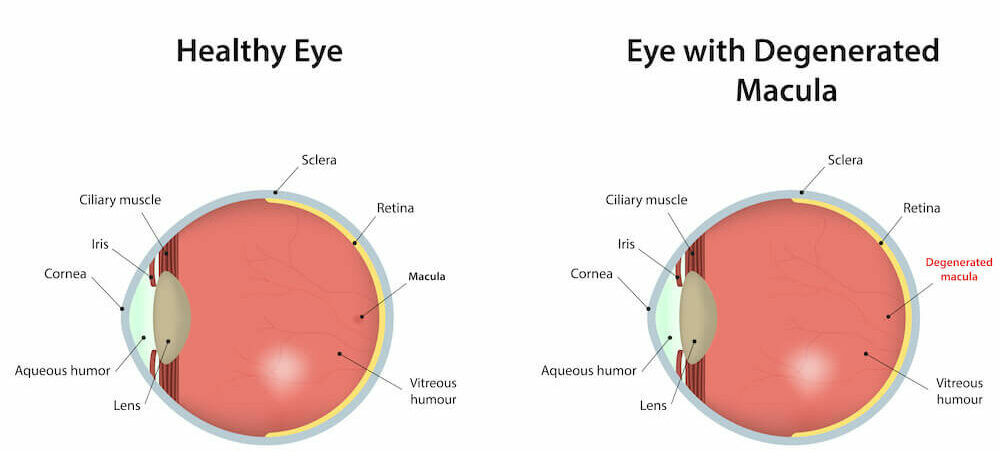Macular Degeneration

Macular degeneration, also known as age-related macular degeneration (AMD), is a retinal disorder that usually affects patients over the age of 65. Macular degeneration patients experience a degradation of the macula, the part of the retina that ensures the eye’s ability to produce clear central vision, which is crucial for reading or driving. Patients with AMD typically experience some degree of vision loss, blurry vision and distorted, wavy vision.
Courtesy of the American Academy of Ophthalmology
There are two types of AMD: dry and wet.
Dry AMD the early stage of the disease, is more common than wet AMD. Patients with dry AMD may have yellow spots known as drusen in and around their macula. Most dry macular degeneration is relatively mild, but some patients can lose vision. The macula can atrophy, sometimes leading to severe vision loss. There are some preventative treatments that can be prescribed at this stage, and careful monitoring of the condition is important.
Wet AMD develops in a relatively small number of patients with dry AMD. In patients with wet AMD, new blood vessels grow beneath the retina, leaking fluid and blood that damage the retina and cause an often-severe loss of central vision. If the condition is treated early and aggressively with injections of medicines directly into the eye, vision loss can be minimized.
Symptoms of Macular Degeneration
Patients with macular degeneration typically experience a gradual, painless degradation of their vision, although vision loss may be sudden in rare cases. Symptoms of macular degeneration include distorted or fuzzy vision or shadow-like areas in their central vision. Diagnostic tools such as fluorescein angiography and ocular coherence tomography may help test patients with AMD.
Treatment of Macular Degeneration
No cure exists for macular degeneration; however, various treatments have been developed to slow the progression of the disease. Smoking cessation is highly recommended. Several nutrients are believed to both lower the risk of AMD and delay the progression from dry AMD to wet AMD. Examples of such nutrients include zinc, lutein, zeaxanthin, vitamins A, C and E, omega-3 fatty acids and omega-6 fatty acids. Patients with wet AMD are often treated with medications that prevent abnormal blood vessel growth, such as Lucentis, Avastin and Macugen.
Lucentis – Lucentis is a synthetic antibody that inhibits the proteins (vascular endothelial growth factors, or VEGFs) responsible for the production of abnormal blood vessels in the retina. It is administered via injections into the eye, which may need to be repeated once a month. Many patients stabilize and vision may actually improve.
Avastin – Avastin is another synthetic antibody similar to Lucentis that inactivates VEGF, thus eliminating new blood vessel growth in the retina.
Eylea – Eylea is a slightly newer drug that also binds and inactivates VEGF. There may be some advantages in patients who do not respond to other treatments, and potentially longer effect.
Photodynamic Therapy Using Visudyne – Visudyne is a laser-activated drug that destroys abnormal blood vessels in the retina. To administer the drug, the surgeon first injects it into the patient’s arm. Next, the surgeon shines a low-intensity laser beam into the eye to activate the medication as it passes through the blood vessels of the retina. Once activated, the chemical painlessly destroys the abnormal retinal blood vessels. Several studies have shown that Visudyne can improve vision and slow the progression of wet AMD in some patients. This treatment also has been used less often since the more effective injections became available.
Macular degeneration is a serious eye disease that, if untreated, can result in permanent vision loss. For a routine examination, or if you are experiencing symptoms of AMD, including fuzzy, distorted vision or shadowy central vision, contact our Delray Beach specialists today at (561) 498-8100 or (561) 734-0267.
